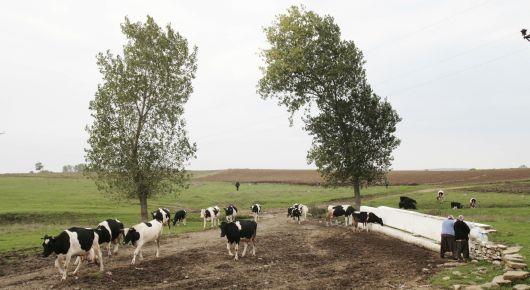Kazakhstan adopted roadmap on dairy industry standards

Kazakhstan has strengthened its commitment to improving the safety of raw milk and dairy products with the signing of a roadmap in the country’s capital Nur-Sultan that will bring the national dairy industry to the level of the Eurasian Economic Union (EAEU) standards.
The roadmap aims to provide a number of measures, including transparent and comprehensive monitoring of animal health and raw milk quality testing as part of the national monitoring system. This testing will determine the current degree of compliance and evaluate the readiness of national laboratories to conduct the necessary tests. The roadmap will also promote inclusiveness through sharing knowledge and best practices.
The document is the initiative of the Dairy Union of Kazakhstan, supported by the European Bank for Reconstruction and Development (EBRD) and FAO. The roadmap was signed by experts of the Veterinary Control and Surveillance Committee (Ministry of Agriculture), the Quality and Safety Control Committee of Goods and Services (Ministry of Health), the Committee for Technical Regulation and Metrology (Ministry of Trade and Integration), the Chamber of Entrepreneurs, the Consumer Protection Union, dairy companies of Kazakhstan.
It is part of a larger initiative to develop an inclusive dairy industry in Kazakhstan, supported by the EBRD and FAO.
The development of the livestock sector is supported by the government of Kazakhstan with a national programme aimed at fostering the country’s dairy industry growth and overcoming remaining bottlenecks.
Most of the country’s raw milk – around 3.9 million tonnes of marketable milk per year – comes from small family farms. Milk yields are low compared to those of neighbouring countries, and availability is seasonal. Milk safety parameters often fall short of the EAEU standard requirements.
The EBRD and FAO will continue working with Kazakhstan’s livestock industry to bridge the gap between food safety practices and the standards of the EAEU, European Union and China in order to create export opportunities for Kazakh producers.
The cooperation will include a wide range of activities, including study tours for Kazakhstan dairy industry representatives, know-how transfer, capacity building and many others.
The EBRD has invested EUR 8.2 billion through 262 projects in Kazakhstan. Of this total, EUR 798 million has been invested through 56 projects in the agribusiness sector. The Bank has a wide presence in Kazakhstan, with two Resident Offices in Nur-Sultan and Almaty as well as five local offices for outreach in the remote areas of the country.
Achieving food security for all is at the heart of FAO’s efforts. It strives to ensure that people have regular access to enough high-quality food to lead active, healthy lives. FAO’s mandate is to raise levels of nutrition, improve agricultural productivity, better the lives of rural populations and contribute to the growth of the world economy.
The FAO Liaison and Partnership Bureau in the Republic of Kazakhstan is implementing eight national and regional projects in Kazakhstan for a total of USD 3.1 million in various areas. FAO's project pipeline in Kazakhstan includes 17 projects with approved funding totalling USD 12.2 million. They are designed to contribute to food security in Kazakhstan and the region.
The Dairy Union of Kazakhstan is the national voice of the milk-processing sector, representing the public policy and regulatory interests of Kazakhstan’s dairy processors. Its members represent some of the most recognized brands in the country and provide for some 70 percent of the retail market.
14 August 2019, Nur-Sultan, Kazakhstan
